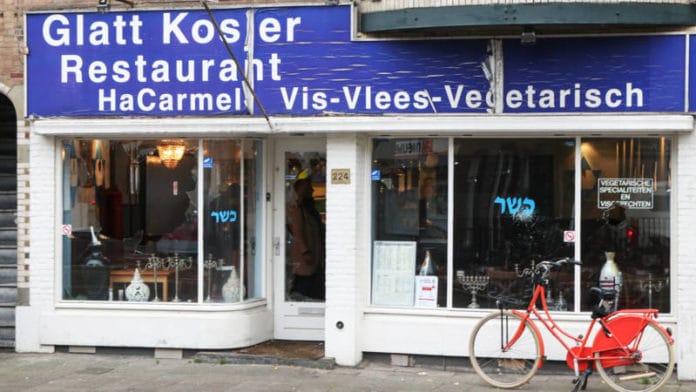Two weeks ago, a 29-year-old man waving a Palestinian flag smashed the windows of a kosher restaurant with a wooden club, stealing an Israeli flag there. Police arrested the suspect on the spot.
The Dec. 7 incident, which occurred the day after President Donald Trump declared that the United States officially recognizes Jerusalem as Israel’s capital, triggered an outpouring of condemnations by Dutch leaders. Prime Minister Mark Rutte called it “terrible,” and 15 lawmakers ate there that evening as a gesture of solidarity.
Yet just 60 hours later the suspect — identified in the media as Saleh Ali — was free. Authorities never divulged details about his identity and origins despite the absence of a gag order, and reports that Ali was a former combatant in Syria’s civil war in the Netherlands on an asylum-seeker visa.


The lack of clarity on these issues is feeding a growing resentment among the Jewish community here regarding the authorities’ handling of the attack itself, along with the aftermath. Some point to the police’s apparent inaction during the attack — in a video, authorities appear to witness the violent incident without interfering — as problematic. But to many Dutch Jews, perhaps the most disturbing aspect is that the draft indictment against Ali mentions only vandalism and theft.
In other words, Dutch officials don’t consider Ali’s actions a hate crime. And that, according to Jewish leaders, is a problem.
During the trial, which began here Wednesday, Ali declined to answer the judge’s questions and “kept going on about the Palestinian cause,” according to Saskia Belleman, the court correspondent of De Telegraaf daily, who reported the suspect has been assigned a psychiatric evaluation.
It also emerged in court that Ali told an officer after his arrest that the attack was “only the first step.”
Asked about the next step, he said: “I will tell you later, no one needs to know.”
Such statements are “chilling,” said Ronny Naftaniel, who spent 40 years at the helm of the Netherlands’ main anti-Semitism watchdog group, CIDI.
“I have never encountered a case like this,” added Naftaniel, who retired in 2013. “And I am one of many Dutch Jews whose confidence in the judiciary has been compromised here.”
By contrast, police held a Dutch Jew named Michael Jacobs for a week this summer for repeatedly standing near anti-Israel protesters while wearing an Israeli flag, even though there are no laws prohibiting it.
“Apparently the judiciary does not see any parallels” between Jacobs and the kosher restaurant attacker, Esther Voet, editor in chief of the NIW Dutch Jewish weekly, wrote in an op-ed published last week.
“Far-right violence is swiftly punished. But this,” Voet wrote of the restaurant attack, “that’s different. The Jews were asking for it.”
The Public Prosecution Service declined to tell JTA anything about the suspect but his age and city of residence in the Netherlands, which is Amsterdam. A spokesman declined to say why other details are being withheld. He said the suspect was released because “there were no grounds to detain him” any longer.
In the background of how authorities are handling the case, Voet said, is fear that the incident may help the Netherlands’ rising populist right wing — led by the anti-Islam politician Geert Wilders of the Party for Freedom.
“Authorities attempt, out of fear from further polarization in society, to sweep everything under the carpet, but it’s having the opposite effect,” she told the Metro daily. “We are not the Jews of past decades, we will not sit quietly as this happens to us. We will speak out.”
This reference to a past in which 75 percent of Dutch Jewry was murdered in the Holocaust is unusual for such a prominent representative of Dutch Jewry. But it’s not the only one. Frits Barend, one of the country’s best-known Jewish journalists, told De Telegraaf daily after the attack: “It reminds of me Kristallnacht” — the name for the 1938 pogroms organized by Nazis against Jews.
PERSBERICHT
Belager koosjer restaurant blijkt terrorist uit Syrië #Carmel pic.twitter.com/mFIqx9NJI9
— Loonstein Advocaten (@LoonAdvocaten) December 13, 2017
According to the lawyer, he also stated during his interrogation that he is prepared to apply more violence in the future in order to achieve his goals. Loonstein calls it incomprehensible that the Palestinian is set free.
CIDI under its current director, Hanna Luden, called the suspect’s release “shocking.”
Coupled with the scaling back this year of police protection for Jewish-owned buildings in Amsterdam — a precaution that was taken after the 2015 slaying of four Jews in Paris by an Islamist — the incident at the HaCarmel kosher restaurant and its handling by authorities “are making Dutch Jews feel less safe,” Naftaniel said.
Earlier this year, similar complaints were heard from many French Jews. They vocally and persistently protested the absence of a hate crime charge from the indictment of a 27-year-old Muslim man who on April 4 killed Sarah Halimi, his 67-year-old Jewish neighbor, while shouting about Allah and calling her a demon. The man, Kobili Traore, had a history of anti-Semitic rhetoric.
Traore was not arrested but was hospitalized for weeks in an institution for treating mental illnesses, although he had no record of such problems. Police refused to disclose his whereabouts and the conditions of his detainment for months.
The Halimi attack occurred just weeks before presidential elections, which brought the far-right National Front party closer to power than ever. As such, the case was “covered up” by the judiciary, charged Francis Kalifat, the president of the CRIF umbrella of French Jewish communities, including during a public address before President Emmanuel Macron.
Amid local and international pressure, French prosecutors added hate crime charges in September.
But the Dutch Jewish community, which on Sunday held a Hanukkah ceremony in Amsterdam to thank police and the justice minister for their protection, has not yet reached their “Sarah Halimi moment,” Naftaniel said, referring to the silent marches that French Jews held to protest the affair.
“But the kosher restaurant has definitely caused many Dutch Jews to pause, look around and ask tough questions of the authorities,” Naftaniel said. “That’s a good thing.”












In this awesome design of things you’ll secure a B+ for hard work. Exactly where you actually misplaced me ended up being on your specifics. You know, it is said, details make or break the argument.. And it couldn’t be more true at this point. Having said that, let me tell you precisely what did give good results. Your authoring is actually quite convincing and that is most likely why I am making the effort in order to opine. I do not make it a regular habit of doing that. Next, despite the fact that I can see the jumps in reasoning you come up with, I am not necessarily certain of just how you appear to unite your points which in turn make your conclusion. For the moment I will, no doubt subscribe to your issue but wish in the near future you connect your dots better.